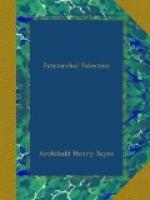The legendary exploits of Sesostris, that creation of Greek fancy and ignorance, were fastened upon Ramses II., whose long reign, inordinate vanity, and ceaseless activity as a builder made him one of the most prominent of the old Pharaohs. It was natural, therefore, at the beginning of hieroglyphic decipherment that the Greek accounts should be accepted in full, and that Ramses II. should have been regarded as the greatest of Egyptian conquerors. But further study soon showed that, in this respect at least, his reputation had little to support it. Like his monuments, too many of which are really stolen from his predecessors, or else sacrifice honesty of work to haste and pretentiousness, a large part of the conquests and victories that have been claimed for him was due to the imagination of the scribes. In the reaction which followed on this discovery, the modern historians of ancient Egypt were disposed to dispute his claim to be a conqueror at all. But we now know that such a scepticism was exaggerated, and though Ramses II. was not a conqueror like Thothmes III., he nevertheless maintained and extended the Asiatic empire which his father had recovered, and the lists of vanquished cities which he engraved on the walls of his temples were not mere repetitions of older catalogues, or the empty fictions of flattering chroniclers. Egyptian armies really marched once more into Northern Syria and the confines of Cilicia, and probably made their way to the banks of the Euphrates. We have no reason for denying that Assyrian troops may have been defeated by his arms, or that the king of Mitanni may have sent an embassy to his court. And we now have a good deal more than the indirect evidence of the treaty with the Hittites to show that Canaan was again a province of the Egyptian empire. The names of some of its cities which were captured in the early part of the Pharaoh’s reign may




